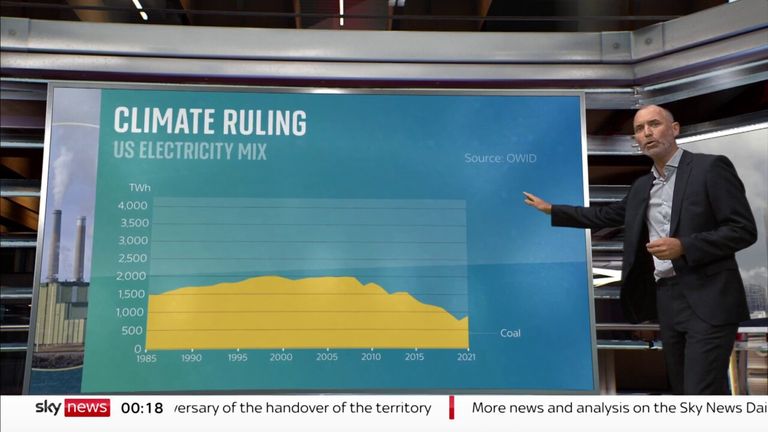Major blow to Biden's domestic climate agenda as US Supreme Court limits federal power to curb emissions
President Biden was banking on federal powers through the Environmental Protection Agency to curb pollution from power plants, which are responsible for roughly 30% of the USA's emissions. The Supreme Court has ruled to limit those powers.
Friday 1 July 2022 00:41, UK
US President Joe Biden's efforts to enforce environmental regulation in the world's second-most polluting country have been dealt a major blow by a Supreme Court ruling on air pollution.
The decision from the currently right-leaning court rules in favour of challengers seeking to curb the power of the Environmental Protection Agency (EPA) to regulate pollution from fossil fuel power plants, which belch out 30% of the country's greenhouse gas emissions.
The court's six conservatives were in the majority, with the three liberals dissenting.
Dissenting, Justice Kagan said in legal documents the Supreme Court "does not have a clue about how to address climate change. And let's say the obvious: The stakes here are high."
She called it "frightening" that the "the Court appoints itself - instead of Congress or the expert agency - the decisionmaker on climate policy."
Justice Gorsuch, agreeing with the ruling, rejected that analysis, saying: "the Court acknowledges only that... the people's elected representatives in Congress are the decisionmakers here - and they have not clearly granted the agency the authority it claims for itself."
'Climate leader'
The decision undermines the ability of Mr Biden, a Democrat, to implement climate policies without the support of legislators in Congress, as well as his ability to live up to his ambitions to be a "climate leader".
His administration set a goal to decarbonise the power sector by 2035, and he came into office with hopes of using the EPA as the main tool to do so.
But, speaking to Sky News two weeks ago, EPA chief Michael S. Regan said while the case "is very important," the president has "a number of tools in his toolbox" to tackle pollution.
Besides going through Congress, which is subject to partisan divides but more binding in the long term, President Biden could regulate greenhouse gases indirectly via other rules on other air pollutants.
Read more: Supreme Court ruling blow for Biden's climate plans - but history is against fossil fuel industry
Christina DeConcini, attorney and government affairs director at Washington DC-based World Resources Institute, said the decision "flies in the face of the science".
But she said "the most important thing" that the United States should do to reach its climate goals would be for Congress to pass the clean energy tax credits package that it is currently negotiating.
EPA has 'exceeded its authority'
The US Supreme Court has been sceptical of the power of federal regulatory agencies like the EPA - which exists within the executive branch - to function without relying on the legislative branch of Congress for approval.
The EPA is the key authority responsible for protecting the public from pollution and other environmental toxins by regulating industry.
Last week, the same justices voted to overturn the constitutional right to choose abortion, which has existed for almost 50 years, paving the way for half the country to severely restrict or completely ban the practice.
Two coal companies and 17 Republican US states - led by West Virginia, a major coal producer - asked the justices to limit the EPA's ability to regulate greenhouse gas emissions from existing coal-and-gas-fired power plants under the landmark Clean Air Act environmental law.
Their challenge came after the EPA, under then president Barack Obama, in 2015 sought to require power plants to slash greenhouse gas emissions - under a sweeping rule called the Clean Power Plan - mainly by shifting toward clean energy sources like solar and wind.
The Supreme Court suspended the rule in 2016, meaning there are no regulations now in force that would reduce carbon emissions from power plants.
The states argued the EPA exceeded its authority by trying to regulate carbon dioxide under the Clean Air Act, and by doing so in a way that would have vast economic impacts.
Watch the Daily Climate Show at 3.30pm Monday to Friday on Sky News, the Sky News website and app, on YouTube and Twitter.
The show investigates how global warming is changing our landscape and highlights solutions to the crisis.





